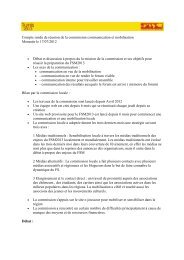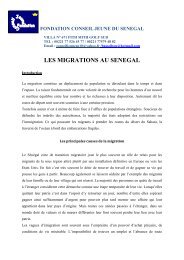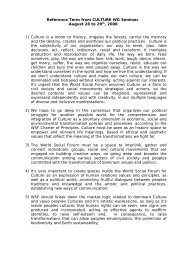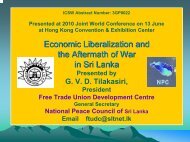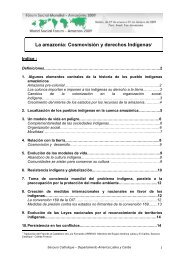Create successful ePaper yourself
Turn your PDF publications into a flip-book with our unique Google optimized e-Paper software.
Solutions to the current crisis ranged from the global to the local, with many<br />
participants emphasising the importance of a “toolkit” of solutions rather than<br />
a single monolithic change.<br />
• Across countless Forum events, environmentalists and labour<br />
leaders alike called for a “green New Deal” based on massive public<br />
investment in the environmental sector to stimulate job creation as<br />
well as environmental preservation.<br />
• For more than a decade, forum-goers have been pushing the idea of<br />
<strong>Press</strong> <strong>Report</strong> <strong>Europe</strong> <strong>WSF</strong> <strong>2009</strong><br />
the Tobin Tax - a tax on international currency transactions. Named<br />
Participants called for massive public<br />
after Nobel Laureate economist James Tobin, who first proposed the<br />
investment in the environmental sector<br />
idea in the 1970s, the funds collected from the tax (a fraction of 1%<br />
of the transaction) would be used as a global fund for development, and for recovering from crises like today’s.<br />
• The Bank of the South, launched in 2007 as a development bank by and for Latin America, was also touted as<br />
an important ingredient in the toolkit of solutions to the global crisis. Giving the region more independence from<br />
existing international financial institutions, the bank would also offer the region added insulation from global<br />
shocks.<br />
• “Food sovereignty” - a term adopted instead of the better-known notion of “food security” - was hailed by many<br />
as a key step for developing nations to become more resilient to emerging food crises. By focusing less on<br />
export-led agricultural policies and instead forging strategic local and regional agricultural policies, activists<br />
argued, nations would be able to better meet the nutritional needs of their populations.<br />
• Participatory budgeting - a programme for mass participation in municipal budget allocation - is another major<br />
ingredient in the toolkit. It was pioneered in the 1990s in the Brazilian city of Porto Alegre where the Forum was<br />
conceived but has spread across the world. This experiment emphasises the democratisation of financial<br />
decision-making - giving every community access to and control over public banks.<br />
Underlying much of the discussion was the sense that the current neoliberal economic model which privileges unbridled<br />
competition between nations, companies and peoples is not a sustainable path for the future.<br />
Click here to return<br />
Walden Bello is a university professor, senior analyst at Focus on the Global South, and president of the<br />
Freedom from Debt Coalition.<br />
Week after week, we see the global economy contracting at a pace worse than that predicted by the gloomiest analysts.<br />
We are now, it is clear, in no ordinary recession but are headed for a global depression that could last for many years.<br />
The origins of the present crisis lie in the strategies adopted by economic and political elites to resolve the crises of<br />
stagflation - the coexistence of low growth with high inflation - which followed rapid growth in the post-World War II era,<br />
both in the G8 economies and in the underdeveloped economies.<br />
Stagflation, however, was but a symptom of a deeper problem: the reconstruction of Germany and Japan and the rapid<br />
growth of industrialising economies like Brazil, Taiwan, and South Korea added tremendous new productive capacity and<br />
increased global competition, while income inequality within countries and between countries limited the growth of<br />
purchasing power and demand, thus eroding profitability.<br />
Dilemma<br />
This produced the dilemma of overproduction.<br />
One “escape route” from the conundrum of overproduction, and for<br />
maintaining and raising profitability, was “financialisation”.<br />
With investment in industry and agriculture yielding low profits as a result of<br />
over-capacity, large amounts of surplus funds have been circulating in or<br />
invested and reinvested in the financial sector - that is, the financial sector<br />
61<br />
Overproduction: many cars made, but no-




